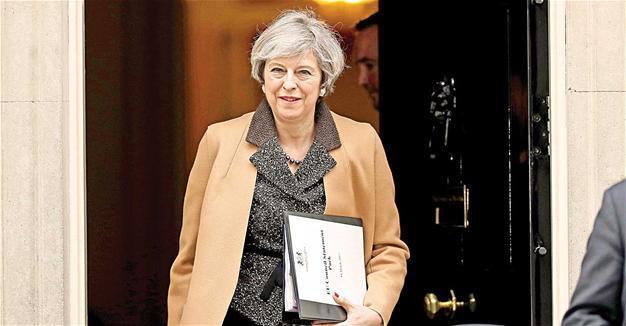Parliament backs Brexit bill, May says divorce ‘in coming days’
LONDON

Parliament gave its approval March 13 for British Prime Minister Theresa May to start Britain’s withdrawal from the European Union, a process to start “in the coming days,” according to May, who addressed the MPs.
Members of the lower house of parliament voted to throw out changes to the bill made by the upper house earlier this month, after the government argued it needed freedom to operate without restriction to get a good deal.
Despite an attempt by the Liberal Democrats in the unelected upper chamber, the House of Lords, to re-introduce the conditions, the Lords also went on to approve the legislation unamended late on March 13, which empowers May to trigger Article 50 of the EU’s Lisbon Treaty, which would start a two-year countdown to Britain’s departure from the bloc.
“We are now on the threshold of the most important negotiation for our country in a generation,” Brexit minister David Davis said in a statement.
“So we will trigger Article 50 by the end of this month as planned and deliver an outcome that works in the interests of the whole of the U.K.”
Addressing MPs, May said the bill could now receive formal assent from Queen Elizabeth II “in the coming days” - a process that would leave the prime minister free to start Brexit.
“We remain on track with the timetable I set out six months ago,” May said, referring to her promise to trigger Article 50 by the end of March.
“I will return to this House before the end of this month to notify when I have formally triggered Article 50 and begun the process through which the United Kingdom will leave the European Union,” she said.
“This will be a defining moment for our whole country.”
Opposition Labour MPs jeered the prime minister as she gave an update on last week’s EU summit - particularly when she recounted how she had urged the other EU leaders to complete Europe’s single market, which Britain will be leaving.
Her promise to consult all Britain’s devolved nations in the Brexit negotiations drew particularly loud laughter, the day after Scottish First Minister Nicola Sturgeon demanded a new independence referendum, to be held in late 2018 or early 2019, once the Brexit terms are clearer.
The British government has said a second referendum is unnecessary, less than three years after Scots rejected independence in a first vote, and May said March 14 that “this is not a moment to play politics.”
May has said Britain will leave Europe’s single market in order to cut immigration, a move that the Scottish National Party (SNP) in power in Edinburgh has warned would be highly damaging to jobs and growth.
SNP First Minister Nicola Sturgeon has said since the June referendum vote for Brexit that Scotland, where a majority wanted to stay in the EU, sought a different future.
The European Commission quickly responded to Sturgeon’s call saying that Scotland would have to reapply to join the EU rather than inheriting Britain’s membership.
May has the power to block the vote and said that another referendum, after Scots voted by 55 percent to reject independence in 2014, would only cause “uncertainty and division.”
 Parliament gave its approval March 13 for British Prime Minister Theresa May to start Britain’s withdrawal from the European Union, a process to start “in the coming days,” according to May, who addressed the MPs.
Parliament gave its approval March 13 for British Prime Minister Theresa May to start Britain’s withdrawal from the European Union, a process to start “in the coming days,” according to May, who addressed the MPs.